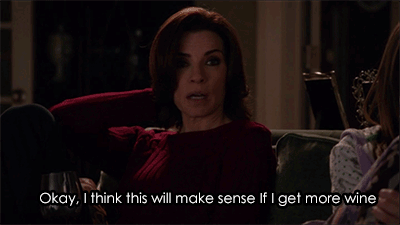1. Television writers are more likely to get/keep jobs.
 |
| Yay jobs! |
Not to say that people who write TV shows are better at their jobs than those who choose to write films; it's simply a matter of numbers. While film scripts are typically written by only one or two people as a kind of freelance project, TV scripts are made by - almost always - staff writers. Staff writers collaborate on scripts to keep episodes of any given TV show consistent with that show's tone and brand. Simply put, there are more positions available to write for TV than to write for film. To find out a bit more about the various positions and hierarchy of a television writing team, check out the Writer's Guild of America's official overview here.
2. Characters develop differently...if at all.
 |
| Ja feel, Alicia. |
3. TV is faster and there's way more of it.
Whereas a feature film writer can take months (or even years!) to write a first draft of a commissioned screenplay, a television writer typically has to churn out a script that's ready for production in 5-7 days. That's less than a week to go from concept to breakdown to outline to rough draft to shooting draft, with a few extra drafts thrown in there somewhere for good measure. And don't even think of missing deadlines. Alex Epstein details the entire process in section taken from his book, Crafty Screen Writing, which can be read here. The upside to this tight production schedule, however, is that television writers are some of the most powerful people in the industry. Unlike film writers - who are typically never on set and practically thrown away after they've turned in a decent draft - television writers are often the producers and showrunners of their own productions. All of this basically just means that the actors shouldn't piss off the writers, since they could literally kill off your character at any moment.
While both television and film have their pros and cons, it almost goes without saying that writing for TV is the more difficult of the two. But if you are up to the challenge and can somehow not consistently get chronic writers block, it also may be the more rewarding.

No comments:
Post a Comment